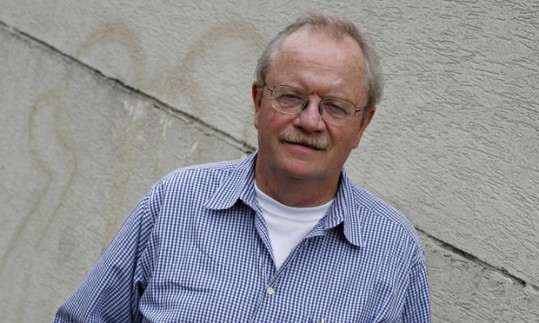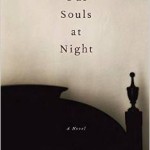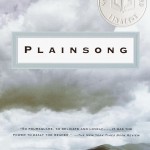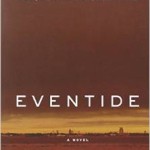 Kent Haruf – 1943-2014
Kent Haruf – 1943-2014
This post is going to sound a lot like one from a couple of weeks ago — Summer Fiction Update — wherein I thanked a friend and MillersTime reader for introducing me to a writer I didn’t, but should have, known.
Yes. I got another recommendation of a writer somehow not known to me.
Plus, the subject matter and the writing of both these authors have a number of similarities: their novels are set in small, rural, fictitious towns (Holt, Colorado in this instance), and the characters are more important than the plot.
The ‘new’ author is Kent Haruf. Three of the four books I mention below are a trilogy of sorts. The fourth is Haruf’s final book, written when he knew he was dying and published after his death. Although this last one is also set in Holt, you have not met these particular characters in any of the previous Haruf novels.
I read these four over a very short period of time, a total of four days, as they are all quick reads. While the ‘plots’ are mostly devoid of excitement or complexity, all four novels were page-turners for me.
Thanks to Fruzina Harsanyi for pointing me to Haruf and his final book, which sent me looking for and to his earlier ones.
 Our Souls at Night (2015)
Our Souls at Night (2015)
I started with this one, his final one, and it hooked me immediately and thoroughly. It is very short, less than 200 pages and can be consumed in one reading. The story centers around two individuals in their early 70s who find a way to combat the loneliness that each is experiencing.
There is much to say about it, but you should have the pleasure of discovering it for yourself.
All of what is special about Haruf and his writing is contained in it.
 Plainsong (1999)
Plainsong (1999)
This one is probably the best known of the ‘Holt’ books and focuses on six or seven people who live in the town.
Their stories, their lives, overlap and are intertwined. Plot is secondary to character, as it seems to be in much of Haruf’s writing (maybe a bit less so in Our Souls at Night). These are ordinary people presented without being idealized or romanticized. They are generally good people, or at least people who have good intentions, but life events, circumstances, and individual decisions bring conflicts and difficulties for them all. How they respond to these circumstances is what seems to interest Haruf.
 Eventide (2006)
Eventide (2006)
This novel is partially a continuation of Plainsong.
There are further developments relating to some of the individuals you already know, but there are also new events and new characters introduced — a young boy who is caring for his grandfather and a new family that is unable to manage the circumstances of their life.
Plot is less important than character, and once again, Haruf quietly, simply, and without sentimentality brings you into the lives and everyday struggles of these characters.
 Benediction (2013)
Benediction (2013)
I particularly liked this one, perhaps because it mirrored some events from my own life (care taking of a dying parent). We know almost from the opening chapter that “Dad” Lewis is dying, and there is no mystery as to what is going to happen or what happens.
While the story is largely built around a central figure (“Dad”), it is how Haruf presents the events of his life and particularly how he presents all of the important characters in the novel that is so effective. He has a way of bringing you into each individual and letting each of them ‘tell’ you their story.
I have purposely not described the plots nor many details of any of these four novels. Better to approach them, I believe, without knowing too much about what you will discover.
Know, however, that what you will find in Haruf’s works is not some idealized view of rural, small town America. Rather, these are all believable characters — “the precious ordinary” — whose lives are depicted without any need for “suspension of disbelief” on part of the reader. They are all about people you will think about and are likely to remember, and many are people you will like.
And Haruf’s use of language is wonderful. He writes with a quiet simplicity, using only the words that are necessary to convey what his characters are thinking and doing.
If you do not know the writings of Kent Haruf, you are in for a treat.


Carol Haile said:
Thank you! Stopped by the library on my way to an in town , but have to stay at the resort, meeting, to pick up Souls at Night. Read it in one evening and have passed it on to a friend. Such a poignant, gentle, thought provoking read. Will read the rest of his books.